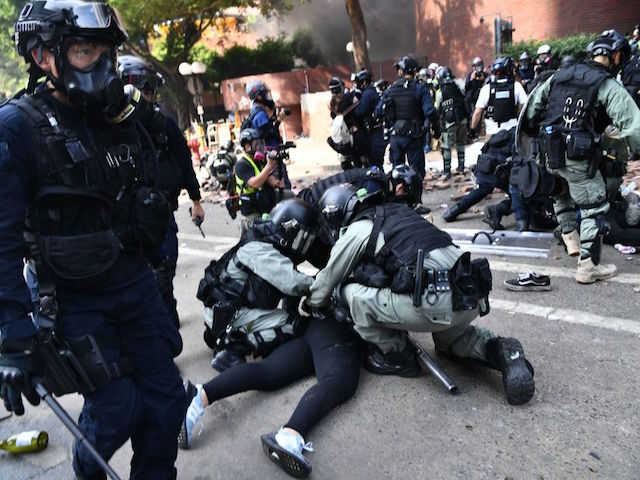A spokesman for Hong Kong’s police force said during an interview Monday that protesters should consider the epithet “cockroach” a term of endearment, as cockroaches are resilient and “full of vitality.”
The spokesman, community relations officer Tam Yu-Hei, also claimed that protesters referring to police officers as “dogs” is a compliment because the animals are obedient and loyal, as police officers should be.
Both terms have come into common usage during the six months of protests against communist repression in the city. Hong Kong is technically a part of China governed under special rules that ban Beijing from imposing communism, but protesters contend that China has increasingly begun to bend the rules and force the local government, which it controls, to silence dissent. The protests initially began in response to a proposed bill allowing China to extradite people it – not Hong Kong – deemed criminals into the notoriously abusive Chinese prison system, currently embroiled in an unrelated slave labor scandal.
Police first began referring to protesters as “cockroaches” in July in official statements from the force, in response to vandalism against the tombs of the parents of defeated lawmaker Junius Ho. Ho had been filmed fraternizing and congratulating armed thugs that week which had stormed a local metro station and beaten unarmed protesters with sticks. Ho lost his legislative seat in last month’s district council election.
“Cockroach” as a dehumanizing term is often associated with the Rwandan genocide, as Hutu extremists used it ofter to refer to ethnic Tutsi Rwandans in encouraging fellow Hutus to massacre and exterminate them.
RTHK, the local broadcaster that carried the interview, said Tam believed Hong Kong protesters should consider being called “cockroaches” “a term of endearment.”
“He said people should look at it positively, as the insect is full of vitality,” RTHK noted. “Tam said he believes his colleagues are very professional and all officers have vowed not to be hostile towards anyone.”
Other outlets quoted Tam directly as asking, “Aren’t cockroaches full of vitality and can survive in times of difficulties?”
As for the term “dog” to insult officers, “we may see it as police being loyal and obedient.” He added that protesters had “doxxed,” or divulged the private information of, 3,000 police officers, targeting them for harassment. Tam reportedly did not address the extensive use of tear gas, baton beatings, and live fire shootings at peaceful protesters. He only criticized the increasingly common practice of police officers hiding their warrant cards and identities to prevent protesters from filing official complaints against them.
“Tam said he looked forward to hearing people’s feedback regarding his comments on the show,” RTHK added.
On the same program, an anonymous police officer denounced his colleagues, saying that officers had been “out of control” in abusing protesters and that he was not alone in being “unhappy with management” in their universal condemnation of protesters and refusal to take responsibility for the use of excessive force extensively documented for months throughout social media.
Tam’s defense of the insult followed the head of the police public relations bureau lamenting how common it had become, decreeing it “not ideal,” and discouraging officers from using it on the same day.
“It is not ideal to use any term to label a group of people,” Public Relations Branch Chief Superintendent Kwok Ka-chuen told reporters Monday. “After six months of conflict, there may be emotions. We will tell our colleagues to maintain emotional management as best as they can.”
Police officials have repeatedly made the same request of their forces since July, despite the higher-ranking officials being the ones to use the term against those implicated in the Junius Ho tomb vandalization. In August, the Hong Kong Free Press (HKFP) obtained an email to officers from Assistant Commander Simon Southgate urging them to not call protesters “cockroaches.”
“Please – lets not give them any opportunities,” he urged.
Southgate confirmed to the outlet that he wrote the email as “a routine reminder of the importance of good conduct and discipline.”
The plea apparently fell on deaf ears. A month later, the outlet Quartz noted, “every week that passes seems to bring with it new videos of police officers yelling ‘cockroaches’ at not just protesters, but now also bystanders and journalists.”
The hordes of armored thugs also adapted the language while assaulting protesters. In one incident in September in North Point, a community known to host a significant number of Chinese ex-pats, an armed mob chanted “beat the cockroaches” while attacking peaceful protesters.

COMMENTS
Please let us know if you're having issues with commenting.